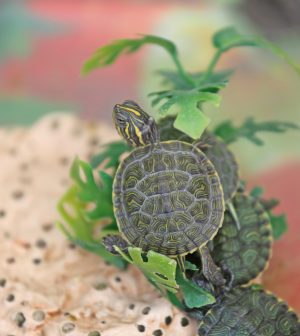- Could Your Grocery Store Meat Be Causing Recurring UTIs?
- Are You Making This Expensive Thermostat Error This Winter?
- Recognizing the Signs of Hypothyroidism
- 10 Strategies to Overcome Insomnia
- Could Artificial Sweeteners Be Aging the Brain Faster?
- Techniques for Soothing Your Nervous System
- Does the Water in Your House Smell Funny? Here’s Why
- Can a Daily Dose of Apple Cider Vinegar Actually Aid Weight Loss?
- 6 Health Beverages That Can Actually Spike Your Blood Sugar
- Treatment Options for Social Anxiety Disorder
Salmonella Linked to Pet Turtles Has Hospitalized 5, CDC Says

Tiny turtles are the cause of a multistate outbreak of salmonella that has led to five hospitalizations, the U.S. Centers for Disease Control and Prevention said Thursday.
The agency has linked an outbreak that has infected at least 15 people in 11 states to turtles that are less than 4 inches long.
Most of the small reptiles were purchased online, about half from a website called myturtlestore.com.
Federal law bans the sale of small turtles as pets.
A CDC report on the investigation said the true number of people infected is likely higher, but many recover without testing or medical care. In the known cases, many of those infected are children.
Typically, salmonella infection includes diarrhea, fever and stomach cramps that develop sometime between six hours and six days after exposure to the bacteria.
The illness usually lasts about four to seven days, though some people will develop severe symptoms requiring hospitalization. Children younger than 5, adults 65 and older and people with weakened immune systems are especially vulnerable.
The CDC advises not buying turtles with shells that are less than 4 inches long. The agency says turtles longer than 4 inches should be purchased only from reputable pet stores or rescues. Here are some of the CDC’s other recommendations:
- Don’t get a turtle if you are in a group more vulnerable to salmonella.
- Stay healthy by always washing your hands after touching, feeding or caring for your turtle. Ensure that your children are also washing their hands well after handling the turtle.
- If you have a turtle you no longer want, do not discard it. Call your local pet store or reptile rescue for help.
State health departments can answer questions about infections in specific states.
More information
The U.S. Food and Drug Administration has more on salmonella.
SOURCE: U.S. Centers for Disease Control and Prevention, July 21, 2022
Source: HealthDay
Copyright © 2026 HealthDay. All rights reserved.










